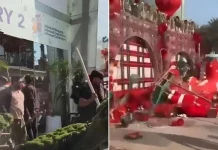DM Monitoring
On 20 June, the Chhattisgarh Christian Forum filed an FIR against the Bijapur district unit of Shiv Sena for the event. Referring to the social-media posts, banners, posters and pamphlets related to the upcoming programme, the forum’s complaint to the Khamardih police station stated, “This publicity material throttles the Christian community’s liberty, fraternity, right to life and religious freedom, which is a serious offence.” In a similar letter addressed to the district collector of Bijapur, the forum wrote that “except for the Constitution, no one else can set conditions to reside in India.”

When asked about the Shiv Sena rally, Mamta Ali Sharma, the town inspector of Khamardih, said, “We have forwarded the complaint to Bijapur. Once more details come from there, we will proceed with the investigation.” When asked if any action will be taken against Shiv Sena’s state secretary, Resham Jangde, and the state party vice-president, Chandramouli Mishra, both of whom had helped organise the rally, she reiterated that they are waiting for more details from Bijapur police officials.
The government’s reaction to anti-Christian rhetoric and violence in the state has often been lacking. The pastor from Sukma district told me that he had filed a FIR on behalf of the family whose house was destroyed with the local police station in Sukma. When I asked him about police response to such complaints, he sounded cynical. “They go to the village after two–three days to take witness statements and survey the area where the violence took place,” he said. “Instead of taking action, they only intimidate us more. They say, ‘There are three Christian homes. Beat them as well.’” Gowardhan Nirmalkar, the inspector of Sukma police station, said, “The accused have been arrested and produced before the Sukma court.” He continued, “There are ten accused. It appears to be a fight between Hindus and Christians. I have arrested all those whose names have come up so far in connection to the incident. I am personally investigating it.” He denied the involvement of any organisations in the attack.
In a similar vein, Kumar told me, “Unless we pressurise the police, they don’t do any work. They set it aside and it is only when we take it all the way to the high court that the matter is heard.” He told me about one such case. In September 2014, the Chhattisgarh Christian Forum filed a petition challenging a resolution passed by the gram sabha in Sirisiguda village that banned “religious activities such as prayers, meetings and propaganda of all non-Hindu religions.” In May and June of 2014, over fifty other gram panchayats in Bastar had passed similar resolutions under the state’s Panchayati Raj Act, which prohibited “all non-Hindu religious propaganda, prayers and speeches in the villages.” In October 2015, the Bilaspur High Court ruled in favour of the Chhattisgarh Christian Forum. Though the high court struck the resolution down as unconstitutional, the Sirisiguda village council, as well as others, continue to override the Constitution in the tribal belt.
Pannalal, the president of the Chhattisgarh Christian Forum, told me that there had been a considerable infiltration of the RSS into Adivasi society in Bastar, in southern Chhattisgarh. He said that, in northern and central Chhattisgarh, the number of attacks against Christians has reduced due to a few high-profile court cases that prosecuted Hindutva outfits who led such attacks. “The RSS units are very active in Bastar,” he said. “The attacks which occur there are instigated by some vested interests.” He told me that previously the Bajrang Dal—a militant organisation affiliated with the RSS—used to directly attack churches. Now, he said, they tend to make Adivasis affiliated with them attack people from their own community who have converted to Christianity. “They are turning tribals against other tribals. Now they are not coming forward themselves. It is an instigated fight.”
Concluded




